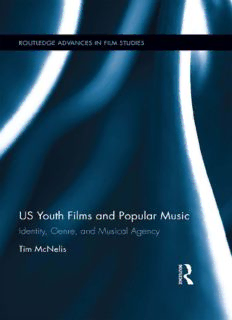
US Youth Films and Popular Music: Identity, Genre, and Musical Agency PDF
Preview US Youth Films and Popular Music: Identity, Genre, and Musical Agency
US Youth Films and Popular Music This book brings theory from popular music studies to an examination of identity and agency in youth films while building on, and comple- menting, film studies literature concerned with genre, identity, and representation. McNelis includes case studies of Hollywood and inde- pendent US youth films that have had commercial and/or critical success to illustrate how films draw on specific discourses surrounding popular music genres to convey ideas about gender, race, ethnicity, sexuality, and other aspects of identity. He develops the concept of ‘musical agency’, a term he uses to discuss the relationship between film music and char- acter agency, also examining the music characters listen to and discuss, as well as musical performances by the characters themselves. Tim McNelis is a youth film and film music scholar with chapters in Inter national Cinema and the Girl: Local Issues, Transnational Con- texts and The Time of Our Lives: Dirty Dancing and Popular Culture. He has also co-authored pieces on songs in Wes Anderson films and visible playback technology in film. Routledge Advances in Film Studies For a full list of titles in this series, please visit www.routledge.com. 45 Mobility and Migration in Film and Moving Image Art Cinema Beyond Europe Nilgün Bayraktar 46 The Other in Contemporary Migrant Cinema Imagining a New Europe? Guido Rings 47 Horror Film and Affect Towards a Corporeal Model of Viewership Xavier Aldana Reyes 48 India’s New Independent Cinema Rise of the Hybrid Ashvin Immanuel Devasundaram 49 Early Race Filmmaking in America Edited by Barbara Tepa Lupack 50 Film Text Analysis New Perspectives on the Analysis of Filmic Meaning Edited by Janina Wildfeuer and John A. Bateman 51 The Camera-Eye Metaphor in Cinema Christian Quendler 52 Surveillance in Asian Cinema Under Eastern Eyes Edited by Karen Fang 53 US Youth Films and Popular Music Identity, Genre, and Musical Agency Tim McNelis US Youth Films and Popular Music Identity, Genre, and Musical Agency Tim McNelis First published 2017 by Routledge 711 Third Avenue, New York, NY 10017 and by Routledge 2 Park Square, Milton Park, Abingdon, Oxon OX14 4RN Routledge is an imprint of the Taylor & Francis Group, an informa business. © 2017 Taylor & Francis The right of Tim McNelis to be identified as author of this work has been asserted by him in accordance with sections 77 and 78 of the Copyright, Designs and Patents Act 1988. All rights reserved. No part of this book may be reprinted or reproduced or utilised in any form or by any electronic, mechanical, or other means, now known or hereafter invented, including photocopying and recording, or in any information storage or retrieval system, without permission in writing from the publishers. Trademark notice: Product or corporate names may be trademarks or registered trademarks, and are used only for identification and explanation without intent to infringe. Library of Congress Cataloging-in-Publication Data CIP data has been applied for. ISBN: 978-1-138-94691-0 (hbk) ISBN: 978-1-315-67053-9 (ebk) Typeset in Sabon by codeMantra For Elena, with love and respect This page intentionally left blank Contents List of Figures ix Acknowledgements xi Introduction: Youth Films, Identity, and Musical Agency 1 Part I She’s a rebel? Girls, Guitars, and agency 21 1 The Girl Can’t Have It: Restricted Musical Agency in 10 Things I Hate About You and Love Don’t Cost a Thing 30 2 Queer Agency and the Reappropriation of the “Technophallus” in All Over Me 43 3 Silent Punk and Audible Folk: Musical Sleight-of-Hand in Juno 56 Part II Listening to the Other: Cultural Borrowing and Critical reflection 69 4 Consumption, Authenticity, and Identity Experimentation in Ghost World 78 5 “I didn’t move to Bosnia”: Critical Cultural Immersion in Save the Last Dance 92 6 Cheerleaders, Bullies, and Nerds: Intersections of White Stereotypes and Black Music in Bring It On, Mean Creek, and Napoleon Dynamite 106 viii Contents PART III Unheard Ethnicities: Musical Construction of Ethnic Identity and Agency 119 7 ‘Old World’ Ethnicity, Hybrid Identity, and ‘New World’ Agency in Real Women Have Curves 127 8 “Neighbourhood is sure changing, isn’t it?”: Evolving Traditions and Complex Identities in Quinceañera 143 9 Reimagining the All-American Teenager: Inaudible Ethnicity and Agency from the Margins in Better Luck Tomorrow 158 Conclusion: The Continuing Relevance of Film Music to Identity and Agency 172 Index 183 List of Figures 0.1 Coach Carter ensures the party’s over. 14 1.1 Kat is silenced and surveilled. 35 1.2 Verona gives Kat the gift of musical agency. 36 1.3 Crazy cool dreads: an alternate ending. 39 2.1 Claude and Lucy: finally plugged in. 54 3.1 Juno and Mark have an illicit jam session. 62 3.2 ‘Café Triste’: Juno’s excluded performance. 64 4.1 Enid tries on “a 1977 original punk rock look”. 79 4.2 Enid hears ‘Devil Got My Woman’ for the first time. 81 4.3 Seymour freezes with his ice cream. 85 5.1 Derek teaches Sara hip hop attitude. 97 5.2 Sara dances under the “L” track. 103 6.1 Napoleon shows off his moves in front of the students. 112 7.1 Ana watches as a woman serenades an invisible audience. 130 7.2 A ‘Chica Dificil’ waits for the bus to school. 139 8.1 Serious dancing at the quinceañera. 148 8.2 Queering el perreo. 150 8.3 A misleading introduction to Carlos. 152 9.1 All-American boys. 160 9.2 Confrontation at the party. 162
Description: